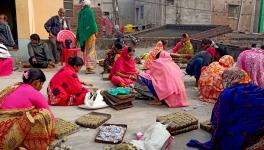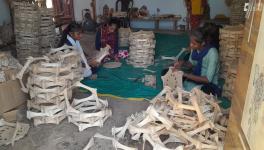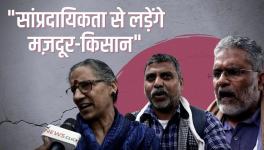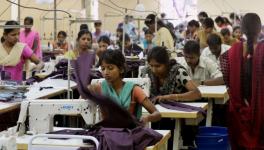The Tall Sugarcane in Beed Hides a Bitter Truth
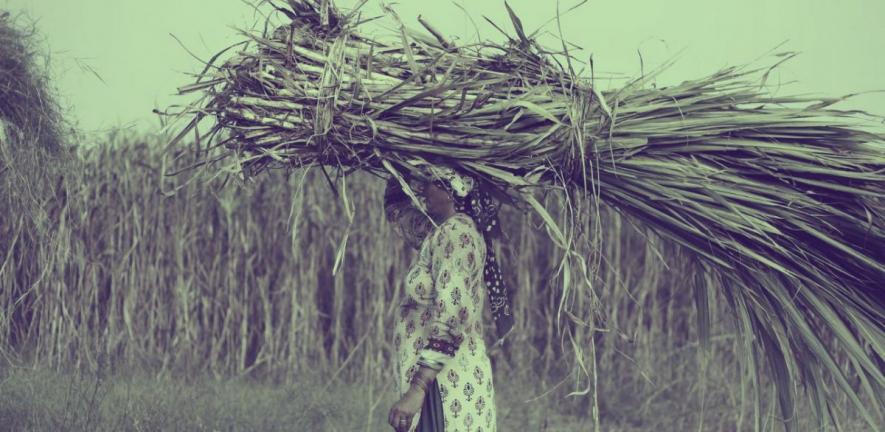
Image for representational purpose. Credit: The Leaflet
Hysterectomy, a surgery to remove some or all parts of the uterus, is a sensitive procedure that is usually undertaken if a woman’s life could be endangered without it.
A few years ago, news of mass hysterectomies taking place in areas such as Beed, Maharashtra, was brought to light.
Even though there was a huge media outcry against this grim practice, it is still prevalent in the rural districts of the country and the women undergoing hysterectomies are made to face dire conditions.
Indian courts have rendered verdicts to curb the practice of unnecessary hysterectomies as recently as April 2023, but the tribulations faced by women in Beed keep worsening.
Financial constraints
Beed is one of the poorest districts in our country. It houses sugarcane cutters, migrant workers and marginal farmers, who rely on seasonal sugarcane work for their income.
The cultivation of sugarcane requires a lot of water. The region receives scanty rainfall, but sugarcane is grown in Beed nevertheless.
Contractors who work for large landowners and sugar mills hire labour from districts around Beed, North Karnataka and Satara for a period of six months every year; from the beginning of November to April.
After the period ends, they go back to their hometowns only to wait for the next season. They earn their annual income only during the months when they work in the sugarcane fields.
Since they are not paid for the entire season but on a day-to-day basis, each day’s work is significant to them.
They cannot forgo even a day’s work because they have to sustain on the income earned in that half of the year to survive the other half of the year, and also because there is a system of fines in place.
On the field, they are subjected to the whims of contractors and are forced to work for long hours to earn minimal pay.
The workers are usually hired in pairs and a couple has a higher chance of getting contracted than a single person.
The contractors chose pairs as families prefer to be displaced together when the job is for many months. It also helps the contractors in getting more workers without needing to provide additional housing.
Families reside together and thus they are easier to manage and the contractors would not need to reach out to other places for workers because the work in the sugarcane fields can be done by anyone with or without skill. All of them are recruited and supervised by the ‘mukadams’ who act as jobbers-cum-foremen.
These ‘mukadams’ act as a link between the factory and the cane cutters. Each couple that migrates from far is paid an ‘uchal’, an advance of ₹50,000–1,00,000 for their period of work, subject to terms and conditions.
A day’s work would pay them approximately ₹250–300, whereas the ‘khada’, or fine payable for missing a single day’s work ranges from ₹500–1,000. Thus, the fine is significantly higher than their wage for a working day.
Unpropitious conditions
Sugarcane farming is a difficult task that is extremely labour-intensive. It is physically strenuous and includes tasks such as cutting, tying, loading, transporting and unloading the sugarcane.
The labourers travel to various factories to deliver sugarcane too. A typical working day for them is about 12 to 13 hours long.
Women devote extra time to perform other domestic labour such as cooking, getting clean water from far-off wells and taking care of the children.
The work includes picking up big batches of sugarcane and piling them into the transport vehicle. The gruelling work leads to physical distress for the women and can also lead to medical emergencies.
The contracted period can go up to eight months. Labourers who are employed as cane cutters usually reside in makeshift huts in cane fields or near sugar mills, and others contracted to load and unload stay further out.
All these are temporary shelters so they lack toilets, drinking water and basic sanitation facilities. The sub-par standards of hygiene and sanitation are one of the causes of medical distress.
Women workers do not have access to proper medication and sanitary napkins.
A Ministry of Health and Family Welfare study on menstrual hygiene found that among women living in rural areas of Maharashtra aged 15–24 years with no prior schooling, only 52.4 percent had access to hygienic methods of menstrual care.
The bitter truth
In Beed, women workers cannot take a break from work even when they are menstruating because of the hefty fine for missing a single day of work.
So these women end up undergoing hysterectomies to avoid bleeding on the field or having medical complications and unplanned pregnancies. Even then, quacks or midwives perform the hysterectomy, and there are no trained professionals to take care of a patient in case of a botched treatment.
As the hysterectomy takes place at an extremely young age, usually around the ages of 23–25, the children are married off at a young age too. They receive poor education and the main form of recreation is playing on the field.
They are married off so that the ‘mukadams’ can then employ the couple for the same work that their parents are doing.
India’s obligations
It is a matter of great concern that hysterectomies are performed in such ghastly conditions and for inhuman reasons in Beed, as this vicious cycle does not have an end.
According to the Universal Declaration of Human Rights, every person has the right to medical care and a human right to care and assistance, as assured under its Article 25.
Additionally, every woman has the right to make choices about her body and reproductive health which is staunchly upheld in Article 7 of the International Covenant on Civil and Political Rights (ICCPR) and in Articles 10h, 12 and 16e of the Convention on the Elimination of All Forms of Discrimination Against Women (CEDAW).
Article 12 of the CEDAW also imposes a general prohibition on discrimination faced by women in the provision of health services and a special legal obligation on States to provide for appropriate services in connection to a woman’s reproductive health.
This obligation also necessitates provision of health services by trained professionals and access to healthcare irrespective of a woman’s marital status. The State is obligated to promote equality in treatment of all genders and ensure the protection of human rights.
The Committee on Economic, Social and Cultural Rights (CESCR) has also stated that every person has the freedom to decide if and when they want to reproduce. They also have the right to be informed and to have access to safe, effective, affordable and acceptable methods for family planning and any other related procedures.
Hysterectomies that are performed under coercion or without full informed consent are a violation of the woman’s personal liberty and other fundamental rights. Full information will include consultation of pre and post-effects as well as considering alternative methods of treatment.
In the case of sugarcane migrants having to undergo hysterectomy to not lose out on a day’s work, no proper care is provided. They are manipulated into making permanent changes to their body and no sound consultation is given to them.
Judicial measures in India
In India, in the recent case of Dr Narendra Gupta versus Union of India & Ors (dated April 5, 2023), the Chief Justice of India (CJI) Dr D.Y. Chandrachud observed:
“The right to health is an intrinsic element of the right to life under Article 21 of the Constitution. Life, to be enjoyed in all its diverse elements, must be based on robust conditions of health. There has been a serious violation of the fundamental rights of the women who underwent unnecessary hysterectomies.”
The CJI also emphasised that every state should set up a state hysterectomy monitoring committee to keep a regular check on medical institutions that partake in unnecessary or forced hysterectomies.
Conclusion
Several non-governmental organisations (NGOs) work with women engaged in sugarcane harvesting in Beed and other parts of the sugarcane belt.
They are trying to provide education and basic healthcare and since they barely get any financial support.
Currently, women who undergo hysterectomies have to provide notice for the day of the surgery to be excused and only then is the day’s wage not forfeited. This comes as a partial win but a lot of progress still remains to be made.
To ensure that the number of hysterectomies by quacks and unlicensed persons decreases, it is important that resources for medical attention are provided. This would require funding from the government or setting up dedicated corporate social responsibility initiatives.
Along with awareness of the issue, the people working in this situation need to be informed of alternatives to the procedure and given a forum to raise their voices against the hardships being faced.
Most importantly, the system of penalising workers for not being able to work on a particular day needs a serious reexamination.
The best system would obviously be to pay women who are menstruating for the days they can’t work, but if that is not possible, the least that should be done is deduct the salary for the days for which the women can’t work.
A system that penalises not just women but entire families for women being women cannot be called just or equitable.
Akriti Kanodia is a fourth year law student at NMIMS Kirit P. Mehta School of Law. Apart from writing about socio-legal issues, she also reviews all the films she watches in her newsletter, Critically Concerned. The views are personal.
Get the latest reports & analysis with people's perspective on Protests, movements & deep analytical videos, discussions of the current affairs in your Telegram app. Subscribe to NewsClick's Telegram channel & get Real-Time updates on stories, as they get published on our website.











